|
Books Should Be Free Loyal Books Free Public Domain Audiobooks & eBook Downloads |
|
|
Books Should Be Free Loyal Books Free Public Domain Audiobooks & eBook Downloads |
|
Religion |
|---|
|
Book type:
Sort by:
View by:
|
By: John Calvin (1509-1564) | |
|---|---|
 Sermons on Psalm 119
Sermons on Psalm 119
The reading-over of these present sermons will sufficiently declare what commodity and profit they may bring with them: As in very deed the author of them right well showeth throughout all his work, in what sort the Lord God hath heretofore been served and also how ordinarily he is served by him. And therefore, for a full recommendation as well of the author as also of the work itself, I intend through God his assistance to set forth none other thing than the same fruit and profit, which they have already gotten that have read them and that fruit which they may make report of, that shall hereafter read them... | |
By: John Cassian (360-435) | |
|---|---|
 Conferences of John Cassian (Part I)
Conferences of John Cassian (Part I)
The Conferences were written by John Cassian at the request of Pope Leo. They document the conversations that Cassian had with the elders living in Scetis , and about principles of the spiritual and ascetic life. The work would go on to be a classic for both the Western and Eastern monastic world, and would frequently be read at mealtimes. - Summary by ancientchristian | |
By: John Churton Collins (1848-1908) | |
|---|---|
 Posthumous Essays of John Churton Collins
Posthumous Essays of John Churton Collins
John Churton Collins was a literary critic who lived from 1848-1908. In 1904 John Collins became professor of English literature at Birmingham University (United Kingdom). He writes about the lives of English and German authors beginning with William Shakespeare (1564-1616) and ending with Alfred, Lord Tennyson(1809-1892). He wrote the book in response to On Heroes, Hero-Worship, and the Heroic in History, by Thomas Carlyle (1840). His son, L.C. Collins, collected these essays from various sources after his father's death. Additional proof-listening by Larry Wilson. | |
By: John Clement Reville (1867-?) | |
|---|---|
 The First American Sister of Charity: Elizabeth Bayley Seton
The First American Sister of Charity: Elizabeth Bayley Seton
This is a picturesque and moving account of the life and work of Elizabeth Ann Bayley Seton (1774-1821), the first native-born citizen of the United States to be canonized a saint by the Roman Catholic Church. This widowed mother of five established schools in New York and Maryland and was the first to found a congregation of Religious Sisters in the United States, the Sisters of Charity of St. Joseph, whose motherhouse stands today in Emmitsburg, Maryland. | |
By: John Donne (1572-1631) | |
|---|---|
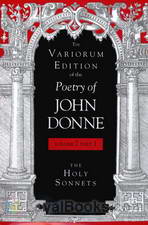 Holy Sonnets
Holy Sonnets
John Donne (1572 – March 31, 1631) was a Jacobean poet and preacher, representative of the metaphysical poets of the period. His works, notable for their realistic and sensual style, include sonnets, love poetry, religious poems, Latin translations, epigrams, elegies, songs, satires and sermons. His poetry is noted for its vibrancy of language and immediacy of metaphor, compared with that of his contemporaries. Towards the end of his life Donne wrote works that challenged death, and the fear that it inspired in many men, on the grounds of his belief that those who die are sent to Heaven to live eternally... | |
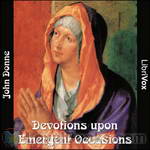 Devotions upon Emergent Occasions
Devotions upon Emergent Occasions
Devotions upon Emergent Occasions is a 1624 prose work by the English writer John Donne. It is a series of reflections that were written as Donne recovered from a serious illness, believed to be either typhus or relapsing fever. (Donne does not clearly identify the disease in his text.) The work consists of twenty-three parts describing each stage of the sickness. Each part is further divided into a Meditation, an Expostulation, and a Prayer. The seventeenth meditation is perhaps the best-known part of the work... | |
 A Selection of Divine Poems
A Selection of Divine Poems
John Donne was an English Jacobean preacher, sometime lawyer, later in life a Member of Parliament and Royal Chaplain. Marrying for love against the wishes of his influential father-in-law; Donne's career was cast into shadow: forcing him to support his wife, Anne, as best he might under a specter of unforgiving penury. Despite such hardships - perhaps because of them - Donne's writings demonstrate a mastery of poetry layered with metaphysical meaning and mystery: which continues to delight and challenge modern-day readers... | |
By: John Eliot (1604-1690) | |
|---|---|
 Christian Commonwealth
Christian Commonwealth
John Eliot, a North American missionary, advocates for post-civil-war England to adopt a representative democracy, using the Mosaic Law as a model. | |
By: John Flavel (1627-1691) | |
|---|---|
 Divine Conduct, or the Mystery of Providence
Divine Conduct, or the Mystery of Providence
Shows God's providence in every aspect of our lives. - Summary by RuthP | |
By: John Fletcher Hurst (1834-1903) | |
|---|---|
 Short History of the Christian Church
Short History of the Christian Church
"The present work has as its basis the series of five Short Histories by the same author, which appeared in the following order: The Reformation, 1884; The Early Church, 1886; The Medieval Church, 1887; The Modern Church in Europe, 1888; and The Church in the United States, 1890. The five volumes form a connected History of the Church nearly down to the present time." John Fletcher Hurst was an American bishop in the Methodist Episcopal Church. He wrote the 5 histories as Chautauqua textbooks. The audio files are in the following order:Part 1: The Early Church Part 2: The Medieval Church Part 3: The Reformation Part 4: The Modern Church in Europe Part 5: The Church in the United States | |
By: John Foxe | |
|---|---|
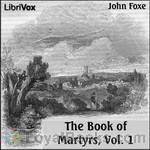 Foxe's Book of Martyrs, A History of the Lives
Foxe's Book of Martyrs, A History of the Lives
The Book of Martyrs, by John Foxe, is an English Protestant account of the persecutions of Protestants, many of whom had died for their beliefs within the decade immediately preceding its first publication. It was first published by John Day, in 1563. Lavishly illustrated with many woodcuts, it was the largest publishing project undertaken in Britain up to that time. Commonly known as, “Foxe’s Book of Martyrs”, the work’s full title begins with “Actes and Monuments of these Latter and Perillous Days, Touching Matters of the Church... | |
By: John Gresham Machen (1881-1937) | |
|---|---|
 Christianity and Liberalism
Christianity and Liberalism
The purpose of this book is not to decide the religious issue of the present day, but merely to present the issue as sharply and clearly as possible, in order that the reader may be aided in deciding it for himself...In the sphere of religion, in particular, the present time is a time of conflict; the great redemptive religion which has always been known as Christianity is battling against a totally diverse type of religious belief, which is only the more destructive of the Christian faith because it makes use of traditional Christian terminology... | |
 Literature and History of New Testament Times
Literature and History of New Testament Times
There is a tendency in the modern Church to neglect the study of Bible history. Such neglect will inevitably result in a loss of power. The gospel is a record of something that has happened, and uncertainty about the gospel is fatal weakness. Furthermore the historical study of the apostolic age—that age when divine revelation established the great principles of the Church's life—is the best corrective for a thousand vagaries. Much can be learned from modern pedagogy; but after all what is absolutely fundamental, both for teacher and for student, is an orderly acquaintance with the Bible facts... | |
By: John Hall (1806-1894) | |
|---|---|
 Life of Rev. Henry Martyn
Life of Rev. Henry Martyn
Henry Martyn , a brilliant and ambitious young student in Cambridge, England, was led by God to be a missionary to India and Persia. While pastoring, starting schools, and teaching the locals as well as Europeans through his role as chaplain for the East India Company, he worked on several far-reaching Bible translations. All this despite much weakness and illness due to harsh climates and difficult travels. This short life of 31 years is a testament to the power of God to work through one life fully dedicated to Him. | |
By: John Henry Newman (1801-1890) | |
|---|---|
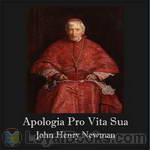 Apologia Pro Vita Sua
Apologia Pro Vita Sua
A religious autobiography of unsurpassed interest, the simple confidential tone of which "revolutionized the popular estimate of its author," establishing the strength and sincerity of the convictions which had led him into the Roman Catholic Church (Wikipedia). "No autobiography in the English language has been more read; to the nineteenth century it bears a relation not less characteristic than Boswell's 'Johnson' to the eighteenth." Rev. Wm. Barry, D.D. | |
 Dream of Gerontius
Dream of Gerontius
As a rule, when Cardinal Newman's poetry is mentioned, people think of "The Pillar of the Cloud," better known as "Lead, Kindly Light." This lyric is only one of the many beautiful poems written by an author whose fame as a writer of the finest modern prose in the English language has eclipsed his reputation as a poet. Nevertheless, he wrote a very great poem, "The Dream of Gerontius"—a poem which the intellectual world admires more and more every year, and which yields its best only after careful study and consideration... | |
 Parochial and Plain Sermons, Volume 1
Parochial and Plain Sermons, Volume 1
John Henry Newman's sermons enter the human heart easily and with transformative power. Lucid thinking, beautiful English prose, an integrated theology, insightful spiritual psychology, and a meditative biblical focus combine to make his sermons live even though many of them were written and preached almost 200 years ago. A convert to Roman Catholicism from the Anglican Church, Newman was made a Cardinal and had a wide influence on Catholic thought. More recently, his spiritual depth and personal holiness have been recognized, and in 2020 he was canonized becoming Saint John Henry Cardinal Newman. - Summary by Russell Hobbs | |
By: John Locke (1632-1704) | |
|---|---|
 Two Treatises of Civil Government
Two Treatises of Civil Government
The Two Treatises of Civil Government is a work of political philosophy published anonymously in 1689 by John Locke. The First Treatise is an extended attack on Sir Robert Filmer’s Patriarcha, which argued for a divinely-ordained, hereditary, absolute monarchy. The more influential Second Treatise outlines a theory of civil society based on natural rights and contract theory. Locke begins by describing the “state of nature,” and goes on to explain the hypothetical rise of property and civilization, asserting that the only legitimate governments are those which have the consent of the people... | |
By: John Lord (1810-1894) | |
|---|---|
 Beacon Lights of History, Vol 1: The Old Pagan Civilizations
Beacon Lights of History, Vol 1: The Old Pagan Civilizations
The first of 14 volumes, this book discusses ancient civilization looking primarily at religion and philosophy. | |
By: John Mark | |
|---|---|
 Jesus of Nazareth, A Biography
Jesus of Nazareth, A Biography
"Jesus of Nazareth, a Biography, by John Mark," recognizes the author of the second Gospel as that "John, whose surname was Mark" (Acts 15:37), whom Barnabas chose as companion when he sailed for Cyprus on his second missionary journey. In making use of the new title, the plan of the Editor is to present "The Gospel: According to Mark" as it would be printed were it written in the twentieth rather than the first century. (Introduction from Forward, by D. Appleton & Co, Publishers, 1922) | |
By: John Mason Neale (1818-1866) | |
|---|---|
 Mediaeval Hymns and Sequences
Mediaeval Hymns and Sequences
This book is a collection of English translations of medieval Latin hymns. It contains interesting historical and/or liguistic facts about each hymn, some of which are still used in one form or other in the modern Christian church.Note: An asterisk implies a belief that the piece so marked has not previously appeared in an English translation. - Summary by Devorah Allen | |
By: John Milton (1608-1674) | |
|---|---|
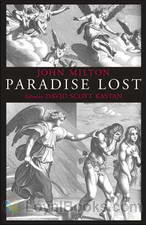 Paradise Lost
Paradise Lost
Magnificent in its scale and scope, this monumental poem by the blind poet John Milton was the first epic conceived in the English language. It describes an omniscient, all powerful God, the Fall of Man, the Temptation in the Garden of Eden, the disgraced angel who later becomes known as Satan, the Angelic Wars fought by Archangels Michael and Raphael and the Son of God who is the real hero of this saga. The poet John Milton was more than sixty years old when he embarked on this immense work of literary creation... | |
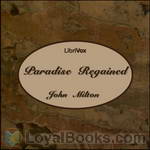 Paradise Regained
Paradise Regained
Paradise Regained is a poem by the 17th century English poet John Milton, published in 1671. It is connected by name to his earlier and more famous epic poem Paradise Lost, with which it shares similar theological themes. Based on the Gospel of Luke’s version of the Temptation of Christ, Paradise Regained is more thoughtful in writing style, and thrives upon the imagery of Jesus’ perfection in contrast to the shame of Satan. | |
 Paradise Regain'd (version 2)
Paradise Regain'd (version 2)
Having been publicly acknowledged as God's "beloved Son," Jesus retires to the desert to meditate upon what it means to be the Messiah, about whose coming many conflicting opinions have been circulating among the Jews. Although a learned rabbi, Jesus possesses no knowledge beyond what is available to all human beings. Satan also takes a new interest in this favored "son of God" and seeks to learn what threat he constitutes. The poem consists of a debate between these two adversaries, each seeking the same understanding of precisely what mankind's Savior will do in a world where the way to success typically lies through "wealth ... | |
By: John Newton (1725-1807) | |
|---|---|
 Messiah: Fifty Expository Discourses on the Oratorio of Handel
Messiah: Fifty Expository Discourses on the Oratorio of Handel
The celebrated German-British composer G.F. Handel premiered his now famous oratorio "Messiah" in 1742. In 1785 there was a celebration at Westminster Abbey of Handel's birth 100 years before. It was on this occasion that John Newton decided to preach 50 sermons from the Bible passages that form the libretto of Messiah. The sermons were preached over two years in the Parish Church of St. Mary Woolnoth, Lombard-Street - 3 miles from Westminster Abbey. - Summary by InTheDesert | |
 Apologia
Apologia
Four Letters to a Minister of an Independent Church by a Minister of the Church of England Quid me alta silentia cogis rumpere? - Virgil Let us therefore follow after the things which make for peace, and things wherewith one may edify another. For in Jesus Christ, neither circumcision availeth any thing, nor uncircumcision; but faith which worketh by love — Rom. xiv.19 Gal. v.6 First printed in 1764 - Summary by Title Page | |
By: John Owen (1616-1683) | |
|---|---|
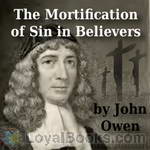 The Mortification of Sin in Believers
The Mortification of Sin in Believers
John Owen, in this Puritan classic, writes succinctly of the matters of the heart in dealing with sin in the life of the Christian. In a way that cuts right to the heart of the matter while leaving no room for excuses, Owen encourages the Christian to “Be killing sin or sin will be killing you.” | |
By: John R. MacDuff (1818-1895) | |
|---|---|
 Evening Incense
Evening Incense
This is a small volume of Evening Prayers. Thoughts to think on in the quiet before bedtime; ideas that edify the soul, calm the mind and prepare our bodies and spirits for sleep. Each is not long, but they are edifying and thought provoking. As the author says in the prefact "May He with whom is "the residue of the Spirit," "cause His Angel to fly swiftly" and touch us in the time of our Evening Oblation; and may all that is amiss in thought and word be lost in the fragrant incense-cloud which ascends from the Golden Altar before the Throne!" "And thou shalt make an ALTAR to burn INCENSE upon: "And thou shalt put it ... | |
By: John Sparhawk Jones (1841-1910) | |
|---|---|
 Seeing Darkly
Seeing Darkly
A short series of Christian sermons covering a range of topics, with the common thread throughout being the relationship between what we do know, what we may know, and what we cannot yet know about our lives, our world, and our faith. - Summary by Devorah Allen | |
By: John Stuart Mill (1806-1873) | |
|---|---|
 Three Essays on Religion
Three Essays on Religion
The Three Essays on Religion were written at different times during Mill's life, and only published after his death. The first two, 'Nature' and 'The Utility of Religion' date from the 1850s - the period between the publication of 'The Principles of Political Economy' and 'On Liberty'. The third longer essay, 'Theism' was written between 1868 and 1870. The three essays were published posthumously in 1874. | |
 Auguste Comte and Positivism
Auguste Comte and Positivism
Part 1 lays out the framework for Positivism as originated in France by Auguste Comte in his Cours de Philosophie Positive. Mill examines the tenets of Comte's movement and alerts us to defects. Part 2 concerns all Comte's writings except the Cours de Philosophie Positive. During Comte's later years he gave up reading newspapers and periodicals to keep his mind pure for higher study. He also became enamored of a certain woman who changed his view of life. Comte turned his philosophy into a religion, with morality the supreme guide. Mill finds that Comte learned to despise science and the intellect, instead substituting his frantic need for the regulation of change. | |
By: John Taylor (1808-1887) | |
|---|---|
 Government of God
Government of God
An outline of the Government of God as held by the Church of Jesus Christ of Latter-day Saints as outlined by John Taylor, third President of the Church. Summary by Wayne Cooke. | |